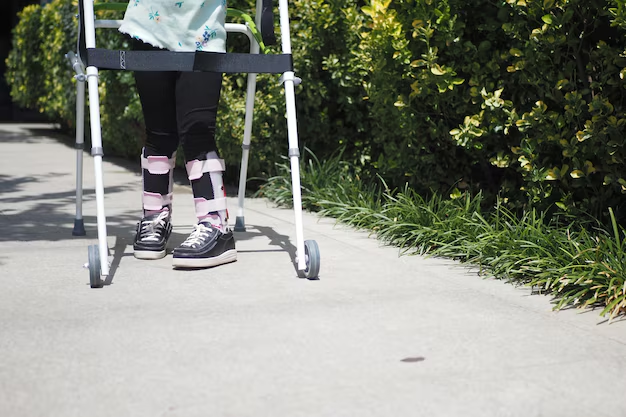Your Guide to Will Medicare Pay For Rollator Walker
What You Get:
Free Guide
Free, helpful information about Medicare Insurance and related Will Medicare Pay For Rollator Walker topics.
Helpful Information
Get clear and easy-to-understand details about Will Medicare Pay For Rollator Walker topics and resources.
Personalized Offers
Answer a few optional questions to receive offers or information related to Medicare Insurance. The survey is optional and not required to access your free guide.
Does Medicare Cover Rollator Walkers? Here's What You Need to Know
Navigating the complexities of Medicare can feel like a daunting task, especially when it comes to understanding what durable medical equipment is covered. For those in need of mobility assistance, rollator walkers offer an invaluable tool for increased independence and safety. But the lingering question remains—will Medicare pay for a rollator walker?
Medicare Coverage for Rollator Walkers
Medicare Part B considers a rollator walker to be durable medical equipment (DME) and typically covers 80% of the Medicare-approved cost, provided certain conditions are met:
Medical Necessity: Your doctor must prescribe the rollator walker and deem it medically necessary for you to function day-to-day.
Medicare-Approved Supplier: You must purchase or rent the rollator walker from a supplier that is enrolled in Medicare’s program.
Clinical Documentation: Proper documentation from your healthcare provider is crucial. This typically involves a face-to-face examination that substantiates the need for the equipment.
Understanding Medicare Part B Costs
While Medicare covers a significant portion, you will generally be responsible for the remaining 20% of the cost after your deductible is met. Here are some steps to keep in mind:
Verify Coverage: Consult a Medicare representative to confirm that your plan includes the specific rollator walker you require.
Check Supplier Eligibility: Ensure that the vendor supplying your equipment is Medicare-approved.
Additional Financial Assistance Programs
Should the out-of-pocket expenses for a rollator walker remain burdensome, there are several avenues to explore for further financial relief:
Government Aid Programs
Medicaid: Depending on your state, Medicaid may offer additional financial assistance or full coverage for durable medical equipment.
State Health Insurance Assistance Programs (SHIP): Provides free, federally funded counseling to help navigate Medicare-related queries and determine additional aid eligibility.
Financial Assistance Options
Supplemental Insurance: Also known as Medigap, this can cover some of the costs that Medicare does not, including the 20% coinsurance.
Non-Profit Organizations: Organizations like Easterseals might offer financial support or discounts on mobility aids.
Community Resources
- Local Charities or Foundations: Many local charities and foundations provide grants or low-cost options for seniors in need of durable medical equipment.
Alternative Financial Management Options
Debt Relief Solutions: If out-of-pocket expenses are accumulating, debt relief services could offer consolidation or restructuring options for existing debts.
Credit Card Offers: Some credit cards offer zero-interest financing on healthcare-related purchases, which might be beneficial for spreading out the cost.
Exploring Educational Grants
Educational resources and grants aren’t just for school fees—they might also cover caregiver training or courses to better handle specific medical needs. Keeping an eye out for:
Caregiver Training Programs: These might be eligible for financial aid.
Older Adult Educational Grants: Occasionally offered to assist with costs associated with training or courses that support living with disabilities or age-related health needs.
In conclusion, while Medicare can significantly subsidize the cost of a rollator walker, understanding the requirements is essential in order to receive coverage. Furthermore, leveraging additional government aid programs and financial assistance options can provide much-needed relief to those facing high medical expenses. As always, proper research and consultation with healthcare and financial advisors can ensure you're making the most informed decisions for your health and finances.
📌 Quick Reference Guide
- 💡 Medicare Part B: Covers 80% of rollator walker cost.
- 🏥 Medicaid: May offer additional support based on your state.
- 🤝 SHIP Counselors: For personalized advice on Medicare.
- 🛡️ Medigap: Consider for covering remaining expenses.
- 🎗️ Non-Profits/Charities: Potential financial aid for mobility devices.
- 💳 Credit Card Solutions: Explore low-interest or zero-interest financing for healthcare purchases.
- 📚 Educational Grants: Seek funding for caregiver training or related educational programs.
What You Get:
Free Medicare Insurance Guide
Free, helpful information about Will Medicare Pay For Rollator Walker and related resources.

Helpful Information
Get clear, easy-to-understand details about Will Medicare Pay For Rollator Walker topics.

Optional Personalized Offers
Answer a few optional questions to see offers or information related to Medicare Insurance. Participation is not required to get your free guide.


Discover More
- Am I Elgible For Medicare
- Am I Enrolled In Medicare
- Am I Qualified For Medicare
- Are Adult Diapers Covered By Medicare
- Are Chemotherapy Drugs Covered By Medicare Part d
- Are Colonoscopies Covered By Medicare
- Are Covid Tests Covered By Medicare
- Are Cpap Machines Covered By Medicare
- Are Cpap Supplies Covered By Medicare
- Are Dental Implants Covered By Medicare
